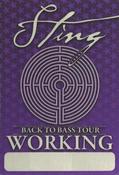
More direct, earthier, dirtier...
Sting forgoes any light show or other gimmicks at the kickoff of his German tour at Munich's Kesselhaus. The concert is nevertheless a minor masterpiece – audience members, music critics, and even fitness trainers would likely agree on that.
For critics who cling to the rock star cliché, it's always been easy to make fun of Gordon Matthew Sumner, better known as Sting: the former English and sports teacher who didn't drown his world-weariness and fear of death in drugs and excess, but rather processed it with yoga and intellectual texts; the Amnesty International member who reads the New York Times and the Guardian daily.
The supposed musical nerd who brought prominent jazz musicians like Branford Marsalis into his band, occasionally dabbled in classical music with John Dowland interpretations or symphony orchestras, and for whom a dominant seventh chord is no stranger. Especially since one has to admit that little of the subversiveness of The Police – who, for example, were the first to ridicule the playback TV shows that were common at the time with comedically asynchronous performances and became one of the most successful pop bands precisely because they gently undermined the established pop rules – remains in the late Sting, the father of six and homeowner of seven.
From an audience perspective, it's usually a pleasure when someone goes on stage well prepared. A real flop is almost impossible. Instead, with a bit of luck, you get a small masterpiece like the "Back to Bass" performance at Munich's Kesselhaus, Sting's own retrospective of his 25 years as a solo artist.
The two and a quarter hours rolled by so casually that it wasn't until afterward that you realized what a perfectly thought-out concept you were being wrapped around. You can be sure that Sting had worked out every single musical detail just as thoroughly as his announcements in German, broken by a nice British accent, but otherwise perfect.
Which starts with the line-up. This time, he wanted it to be more direct, earthier, dirtier, and more direct, so he worked with a comparatively small band, featuring veteran guitarist Dominic Miller ("My right hand for 22 years"), his son Rufus, and "drummer's drummer" Vinnie Colaiuta, along with two violinists, Peter Tickell and Australian Jo Lawry, who provided the special touch.
Not only because Tickell got the only two real solos, the whole thing leaned strongly toward Southern and country rock, even on wavy rip-roars like "Demolition Man" or the funky "Heavy Cloud No Rain"; the chorus of "Love Is Stronger Than Justice" even became entirely bluegrass.
Sting's no-nonsense outfit of jeans and a T-shirt (which matched the worn '54 Fender bass as well as the 60-year-old's wiry body) fit the bill, as did the lack of any light show or other gimmicks.
Sting had also conscientiously tailored his song selection to this setting, both in the six tracks dating back to his Police days and in the 16 others. The selection was more enigmatic, atmospheric, and narrative, like 'Stolen Car' or 'Ghost Story', while overly familiar songs like 'Roxanne' or 'Englishman In New York' were missing. Only during the encore did Sting satisfy the fans who were fixated on the hit songs with a rather banal 'Every Breath You Take' – only to then immediately add another bombastic rendition with 'Next To You'.
All of this combined once again demonstrated Sting's greatness as a songwriter, as the true quality of a good pop song lies in its ability to accommodate any arrangement, any stylistic transformation, without becoming unrecognizable. The fact that he performed 'Message In A Bottle' as the very last encore, solo and—harking back to his earliest beginnings—with guitar, was something Sting had already tested on his symphonic tour, found effective, and now adopted.
Whether from the perspective of a music critic, fitness trainer, or seasoned concertgoer, it took some effort to find something to complain about. It quickly led to the packed Kesselhaus venue, which mocked Sting's idea of a club-like tour and had the same poor conditions in terms of visibility and sound – especially at the beginning, unbearably flat, shrill, and high-pitched – as the neighbouring Zenith.
Within Sting's area of responsibility, however, the only remaining complaint is the long-standing criticism that new songs are missing. In this case, the teacher's revenge, part two, will soon follow: The musical play about the shipyard workers of his hometown of Newcastle upon Tyne is expected to be completed soon – with entirely new songs.
(c) Süddeutschen Zeitung by Oliver Hochkeppel
02282012
SET LIST
- All This Time
- Every Little Thing She Does Is Magic
- Seven Days
- Demolition Man
- I Hung My Head
- I'm So Happy I Can't Stop Crying
- Stolen Car (Take Me Dancing)
- Driven To Tears
- Fortress Around Your Heart
- Fields Of Gold
- Sacred Love
- Ghost Story
- Heavy Cloud No Rain
- Inside
- Love Is Stronger Than Justice (The Munificent Seven)
- The Hounds Of Winter
- End Of The Game
- Never Coming Home
- Desert Rose
- Every Breath You Take
- Next To You
- Message In A Bottle



